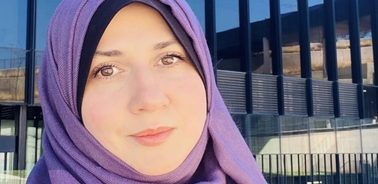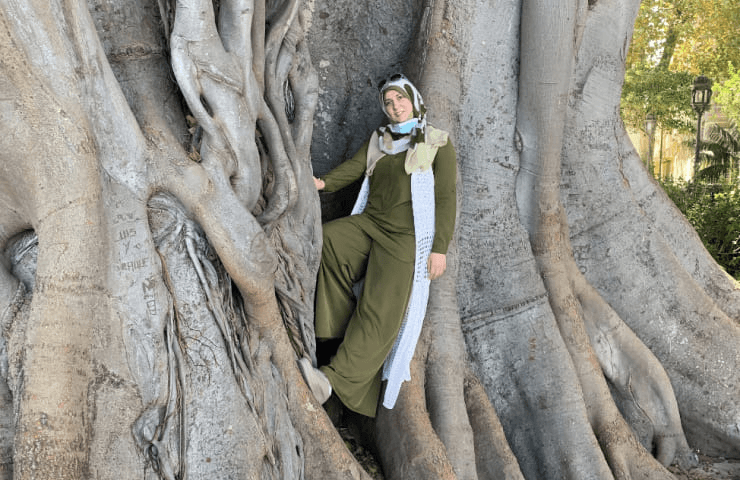Faculty Spotlight: Suzan Awinat

Meet one of IE’s School of Science and Technology newest professors.
Suzan Awinat is more than just an adjunct professor in the Bachelor in Computer Science and Artificial Intelligence degree at IE’s School of Science and Technology. The Jordanian national has dedicated the better part of the past twenty years to understanding Natural Language Processing, including a PhD in Arabic Poem Generation. These days, she is most frequently spotted at IE University’s new Robotics and AI lab, where she helps students to gain familiarity and proficiency with all kinds of robots. Her publications include GE and Semantics and Towards a Meta-model for Natural Computers: An Example Using Metadepth, among others.
Meet one of our newest professors.
What brought you to IE? Where were you before?
Ever since I started university, I have dreamed of becoming a faculty member. So, in order to reach my goal, I decided to continue my academic career and get a PhD. I finished my degree in Computer Science from the University of Jordan and started my master’s degree at the same university. During my master’s degree, I had the opportunity to work as a teaching assistant, and this is when I saw the first light of my dream come true. After that, I worked as an instructor in different institutes and universities, but teaching at IE was the ultimate goal of my journey, and here I am! I am currently working on my PhD in computer engineering and telecommunications at Universidad Autónoma de Madrid. My thesis is in NLP, and I hope to finish it soon.
What do you hope to accomplish with the Robotics Lab?
What I really aspire to, first and foremost, is to try to break the barrier between students and the world of robotics and change the prevailing idea that it is a complex world full of interlocking equations and only geniuses can enter it. I will encourage them to enter the challenge and start their first steps easily. My aspiration is that no student graduates from the School of Science and Technology without having built at least one robot, whether as an individual or group project. I also aspire to make the laboratory a place for use educational robotics to teach Project-based teaching in all other STEM fields.
In addition, the goal for the Robotics Lab is to develop innovative solutions and technologies that can improve people's lives, from healthcare and education to manufacturing and transportation. And to inspire and educate the next generation of robotics engineers and scientists, promoting creativity, curiosity, and collaboration among students, researchers, and industry partners. The Robotics Lab vision is to create a community of experts and enthusiasts who can share knowledge, resources, and expertise, fostering new ideas and breakthroughs in the field of robotics to address some of the most pressing challenges of our time, such as sustainability, social equality, and global health, by using robotics as a tool for positive change and impact.
Have you ever had an a-ha moment while teaching that furthered your research? What was it?
In fact, what I've noticed here at IE is that the students have a very high level of intelligence, attention and analysis. Students often surprise me with new questions that I had not thought of. This not only makes me delve deeper into the subject and research more, but also develops my teaching and preparation skills. While I am preparing the lesson, I try to anticipate as many questions as possible that the students will ask and challenge them and myself to find the best solutions and try every new idea. And because I am currently teaching NLP, which is the same field as my PhD thesis, it happened to me that I added some sections or references that appeared to me only through my preparation for my lectures or through the students’ presentation of them. I also added an entire subsection into the introduction of my thesis on a topic that one of the students raised in front of me.
What book do you wish your students would read before taking your class and why?
I will recommend them to read Artificial Intelligence: A Modern Approach book by Stuart Russell and Peter Norvig. Because the book covers a broad range of needed topics in AI, including problem-solving, knowledge representation, reasoning, planning, learning, natural language processing, perception, computer vision and robotics. The book is widely used as a textbook in undergraduate and graduate courses on AI and machine learning, and it is also a popular reference book for researchers and practitioners in the field. The third edition of the book, which was published in 2009, includes updated material on probabilistic reasoning, learning from data, and robotics, as well as new chapters on multi-agent systems and natural language processing. The book is known for its accessible writing style and clear explanations of complex topics, making it an ideal resource for students and professionals looking to learn about AI. It also includes numerous examples, exercises, and programming assignments, which help students to understand the concepts and apply them in practice.
Please name one of your articles or studies you feel addresses the most important issues for 2023?
One article that could be relevant to the most important issues for 2023 is "The State of AI Ethics in 2022: A Year in Review" by the Ethics & Governance of AI Initiative. The article provides an overview of the progress and challenges in the field of AI ethics in the past year and highlights key issues that need to be addressed in the future, including algorithmic bias, privacy, and transparency. It also offers recommendations for policymakers, industry leaders, and researchers to promote responsible and ethical AI development.
How do you envision the future of robots?
AI technology will continue to improve, and robots will become more intelligent, autonomous, and capable of performing complex tasks with minimal human intervention. This will enable them to learn from their environment and adapt to new situations, and they may also become more customizable. As demand for automation and autonomous systems increases, robots are expected to play a vital role in many sectors of society.
Tell us one personal thing about yourself that none of your students know. A hobby, sport or talent? Strange fact? Unusual interest?
I am a scientist and technologist, as well as a poet and writer. I am currently working on a book about my life story, which I believe deserves to be published and considered. It has not always been easy, but I am grateful for the opportunities and challenges that life has presented me with. Thanks God. I have a strange hobby, which is climbing trees. I enjoy spending time in nature, so if you happen to be walking in a garden or forest and you don't see me next to you, know that I am probably up a tree!
